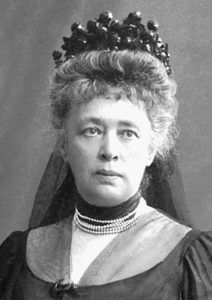We Need Their Voices Today! (19) Bertha von Suttner
TRANSCEND MEMBERS, 30 Oct 2017
John Scales Avery, Ph.D. – TRANSCEND Media Service
Introduction
This is a collection of biographical sketches showing people whose wise voices from the past can help to guide us today. All of the women and men, brief glimpses of whose lives and ideas are portrayed here, gave a high place to compassion. None of them was a slave to greed. We need their voices today!
[Note from TMS editor: It will be posted one biographical sketch per week]
**********************************************
Early life and marriage
Baroness Bertha von Suttner (1843-1914) was born in Prague as Countess Kinsky. She was the posthumous daughter of a Field Marshall, and during the first part of her life, she accepted the military traditions of her family. Later she vigorously opposed militarism, and she became a leader of the peace movement. It was her arguments that persuaded Alfred Nobel to establish the Nobel Peace Prize, and in 1905 she became the first woman to receive the prize.
After serving as Alfred Nobel’s secretary (and close friend) in Paris (1876), Bertha married Baron Arthur von Suttner. However, the von Suttner family was strongly opposed to the marriage, and the young couple left for the Caucasus where for nine years they earned a living by giving lessons in languages and music. During this period, Bertha von Suttner became a highly successful writer.
In 1885 the von Suttner family relented, and welcomed the couple back to Austria. Here Bertha von Suttner wrote most of her books, including her many novels. Their life was oriented almost solely toward the literary until, through a friend, they learned about the International Arbitration and Peace Association1 in London and about similar groups on the Continent, organizations that had as an actual working objective what they had now both accepted as an ideal: arbitration and peace in place of armed force.
Bertha von Suttner immediately added material on this to her second serious book, “Das Maschinenzeitalter” (“The Machine Age”) which, when published early in 1889, was much discussed and reviewed. This book, criticizing many aspects of the times, was among the first to foretell the results of exaggerated nationalism and armaments. Her novel “Lay Down Your Arms”, published in the same year, had a huge impact.
The 1905 Nobel Peace Prize
Here are some excerpts from Bertha von Suttner’s acceptance speech:
“One of the eternal truths is that happiness is created and developed in peace, and one of the eternal rights is the individual’s right to live. The strongest of all instincts, that of self-preservation, is an assertion of this right, affirmed and sanctified by the ancient commandment ‘Thou shalt not kill’.
“It is unnecessary for me to point out how little this right and this commandment are respected in the present state of civilization. Up to the present time, the military organization of our society has been founded upon a denial of the possibility of peace, a contempt for the value of human life, and an acceptance of the urge to kill…
“It is erroneous to believe that the future will of necessity continue the trends of the past and the present. The past and present move away from us in the stream of time like the passing landscape of the riverbanks, as the vessel carrying mankind is borne inexorably by the current toward new shores…
“’If you keep me in touch with developments, and if I hear that the Peace Movement is moving along the road of practical activity, then I will help it on with money.’ These words were spoken by that eminent Scandinavian to whom I owe this opportunity of appearing before you today, Ladies and Gentlemen. Alfred Nobel said them when my husband and I visited with him in 1892 in Bern, where a peace congress1 was in progress…
“… although the supporters of the existing structure of society, which accepts war, come to a peace conference prepared to modify the nature of war, they are basically trying to keep the present system intact. The advocates of pacifism, inside and outside the Conference, will, however, defend their objectives and press forward… to bring nearer the time when the sword shall not be the arbiter among nations.”
A few more things Bertha von Suttner said about peace:
“Strange how blind people are! They are horrified by the torture chambers of the Middle Ages, but their arsenals fill them with pride!!”
“After the verb ‘to Love’, ‘to Help’ is the most beautiful verb in the world.”
Bertha von Suttner, famous antiwar author, friend and mentor of Alfred Nobel without whose advice to him the Peace Prize would not exist, early leader of the peace movement, we need your voice today!
Contents:
19 Bertha von Suttner
20 George Orwell
21 Helen Keller
22 We need their voices, and yours!
________________________________________________
 John Scales Avery, Ph.D., who was part of a group that shared the 1995 Nobel Peace Prize for their work in organizing the Pugwash Conferences on Science and World Affairs, is a member of the TRANSCEND Network and Associate Professor Emeritus at the H.C. Ørsted Institute, University of Copenhagen, Denmark. He is chairman of both the Danish National Pugwash Group and the Danish Peace Academy and received his training in theoretical physics and theoretical chemistry at M.I.T., the University of Chicago and the University of London. He is the author of numerous books and articles both on scientific topics and on broader social questions. His most recent books are Information Theory and Evolution and Civilization’s Crisis in the 21st Century (pdf).
John Scales Avery, Ph.D., who was part of a group that shared the 1995 Nobel Peace Prize for their work in organizing the Pugwash Conferences on Science and World Affairs, is a member of the TRANSCEND Network and Associate Professor Emeritus at the H.C. Ørsted Institute, University of Copenhagen, Denmark. He is chairman of both the Danish National Pugwash Group and the Danish Peace Academy and received his training in theoretical physics and theoretical chemistry at M.I.T., the University of Chicago and the University of London. He is the author of numerous books and articles both on scientific topics and on broader social questions. His most recent books are Information Theory and Evolution and Civilization’s Crisis in the 21st Century (pdf).
This article originally appeared on Transcend Media Service (TMS) on 30 Oct 2017.
Anticopyright: Editorials and articles originated on TMS may be freely reprinted, disseminated, translated and used as background material, provided an acknowledgement and link to the source, TMS: We Need Their Voices Today! (19) Bertha von Suttner, is included. Thank you.
If you enjoyed this article, please donate to TMS to join the growing list of TMS Supporters.

This work is licensed under a CC BY-NC 4.0 License.


Thank you for amplifying the too often ignored, unknown or forgotten voice of Bertha von Suttner, one of our great sheroes in the struggle for peace and dignity for all people.